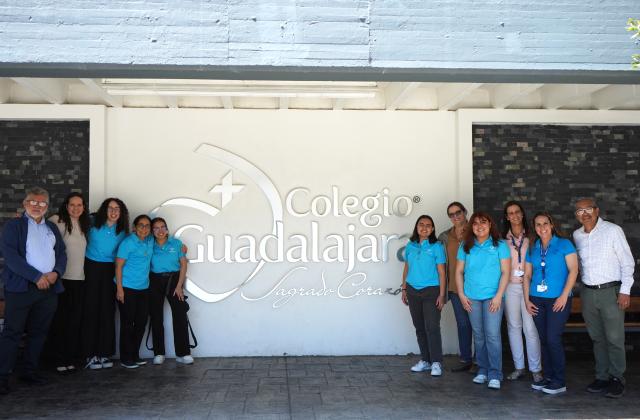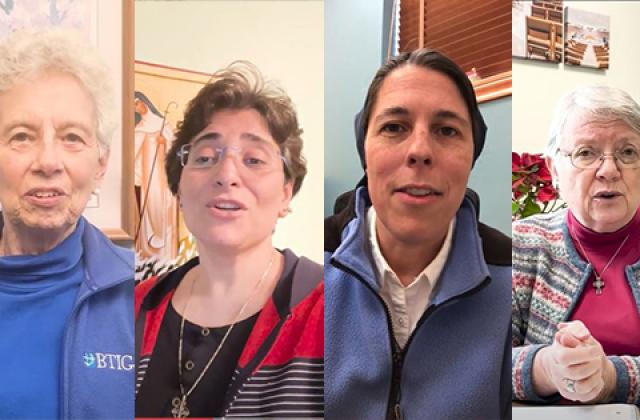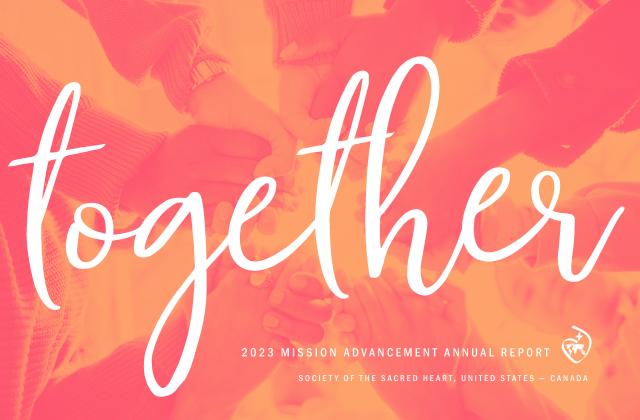Dear Sisters and Friends in the Family of the Sacred Heart,
This year as we celebrate the Feast of the Sacred Heart in a time of darkness and uncertainty, we listen to the invitation of Jesus: Come, all you who are heavy burdened, take my yoke upon you and learn from me, for I am meek and humble of Heart. (Matthew 11: 28-29) For perhaps the first time since we have become a global community, we do not need to search for suffering that we hold in common across the globe. It feels like a heavy yoke has fallen on the shoulders of all of us and particularly on the shoulders of the most vulnerable – poor people, all who are victims of racism, migrants, the elderly. We have been SHOCKED AWAKE not just by the COVID-19 virus, but by also all its tragic consequences and the tumultuous state of our world. No one can deny that our blessed world is broken.
As we celebrate this feast of Jesus’s loving heart, listening to the cries of our world, let us humbly place ourselves in our common home:
Our common home is like a sister with whom we share our life and a beautiful mother who opens her arms to embrace us. “Praise be to you, my Lord, through our Sister, Mother Earth, who sustains and governs us, and who produces various fruit with coloured flowers and herbs.” This sister now cries out to us because of the harm we have inflicted on her by our irresponsible use and abuse of the goods with which God has endowed her. We have come to see ourselves as her lords and masters, entitled to plunder her at will. The violence present in our hearts, wounded by sin, is also reflected in the symptoms of sickness evident in the soil, in the water, in the air and in all forms of life. (Laudato Si’ 1-2)
On Pentecost weekend, I sat in the Villa Lante garden experiencing the beauty of spring in our common home and asking Sophie to help me discover what THE PIERCED Heart of Jesus is inviting us to in our 21st century crisis moment. The suffering Sophie saw around her and her deep experience of the wounded Heart of Jesus, gave her the courage to act, to be an active part of God’s plan to be and show God’s love in the midst of violence and desecration in the 19th century. The CALL I heard from Sophie is a call to SOLIDARITY:
ENTER INTO THE PIERCED HEART OF JESUS, EXPERIENCE THE SUFFERING OF GOD’S PEOPLE AND ALL CREATION, BE IN SOLIDARITY WITH EACH OTHER AND WITH PEOPLE WHO ARE SUFFERING, DO NOT SIT AND WAIT, DISCOVER ANEW THE WAYS FOR OUR TIME TO MANIFEST GOD’S LOVE.
In some ways, the Society of the Sacred Heart has engaged in a 220-year long discernment about who God is calling us to be and what God is calling us to do. Sometimes we have done this with more clarity, sometimes with great courage, always with authenticity and a desire to follow Sophie’s lead. Discerning how God is calling us to respond to the needs of God’s people and living the charism and mission with faithfulness is clearly our way.
Just as Sophie lived her moment in history and listened to the calls of her time, COVID-19 and the state of our world shout to us to PAY ATTENTION to our moment in history. The General Chapter of 2016 helped us recognize the need to refocus. It gave us a vision and a call. As we celebrate this feast, I urge you to spend time rereading this moment in history in the light of these calls -- to cross frontiers, to listen in silence to the heartbeat of God in ourselves and in our world, to live more humanly in the radical style of Jesus, to be One Body in closer solidarity with each other. The whole Society is engaged in looking at new ways to organize ourselves for the sake of mission and ways to share our resources in a more equitable way. THE SHOCK OF THIS MOMENT is an opportunity to put flesh on our commitment, an opportunity to change the way we locate ourselves, to ask ourselves how can we as a congregation organize ourselves in new ways to RESPOND IN SOLIDARITY with each other and with those who are most suffering.
Perhaps we need to ask ourselves more clearly What is God’s plan for us? That is a different question from What is our plan for ourselves? As we enter more deeply into the pierced heart of Jesus, filled with all the suffering of humanity that we see throughout our world, I hope each of us will contemplate what this suffering is saying to us from God’s perspective. Reflecting on the readings for the feast is one way to start.
The first reading reminds us that God created and loves each being and all creation is Sacred to God. In Laudato Si’ Pope Francis calls this interconnectedness with creation ‘integral ecology.’ Deuteronomy 7:6 tells us and we believe that each person has a place in God’s heart and no one is left out. Recognizing the sacredness of each person is the basis of Catholic Social Teaching and the underpinning of universal human rights. Sadly, when we look around we see that much life is not sacred. We know people who are afraid to be on the streets because of the color of their skin with fear of violence or even death. We know people who are alone and hungry, without work, in fear of losing their homes, or perhaps isolated in a nursing home. We see people on the move from country to country, walking from one end of a country to the other, crossing large bodies of water, deserts and mountains to find safety. Like Sophie we hold people and their suffering before God, in our times of silence, before the Eucharist. We anguish because God’s sacred people and God’s sacred planet are suffering.
We need to WAKE UP AND PAY ATTENTION to this moment when our hearts are filled with both fear and compassion, to allow this pain to enter into our own hearts, to begin the slow process of transformation and the invitation to real solidarity. The first step toward SOLIDARITY is knowing real people who are suffering, and deepening our compassion.
What does SOLIDARITY look like today when we hear the words Beloved, if God so loved us we must love one another. What does love look like in this pandemic ravaged world? What does love look like when we watch death and violence on television or in the streets of our cities, towns and villages. What does love look like when we see children who are hungry and know that food is being disposed of because there is no market. Hopefully being shaken has laid the groundwork for what I would call an INCARNATIONAL YEAR. This is a time not to just relish that “God loves us”; it is a time to deeply incarnate God’s love in very concrete ways in a world that is strongly out of balance in favor of the powerful. Sophie’s outrage at the violence and injustice of her day, the desecration and disregard for Jesus and the Blessed Sacrament, fueled her passion to call together a group of women to restore the faith and educate young women to do likewise. We need to ask ourselves what sparks our passion in this moment of salvation history. When we contemplate the heartbeat of God in today’s world, do we allow ourselves to become enraged at the injustice we see and discover new ways to make known the love of Jesus? Within our global community we have vastly different ways of responding to reality, usually influenced by who we “rub shoulders with”, how and to whom we minister, our age, our culture, our connection with people. In SOLIDARITY WITH EACH OTHER ACROSS OUR GLOBAL COMMUNITY, we need to tap into justified rage and have conversations of consequence, to understand and value the different faces of love, to learn from each other. SOLIDARITY DEMANDS A DIALOGUE through which we come to accept and respect the experience that each one of us brings to our common search. With whom are we willing to dialogue? Whether our way is demonstrating against the sin of racism, accompanying Muslims and Christians in dialogue, engendering hope through teaching or leading a school or university or a women’s project or in spending time before the Blessed Sacrament, holding the suffering of our world with Christ, these are the ways that God is calling us to live this gospel imperative in SOLIDARITY WITH THOSE WHO SUFFER AND WITH EACH OTHER.
During my reflection with Sophie, I remembered the Chapter 1970 and its call to SOLIDARITY. Over 50 years ago our sisters wrote:
SOLIDARITY will shake us out of our complacency. It requires that all take whatever steps they can to ensure a more just distribution of the world’s goods; it demands an appreciation of other cultures and traditions; it means an end to any attitude of power and paternalism. This option implies, according to needs and possibilities, the long-range planning of our works in a global perspective – planning that leads to resolute action. It should also lead to us to take a stand against the dehumanizing structures of a consumer society. (General Chapter 1970, p.16)
These are audacious words, a call that we have been trying to live out in one way or another over these last fifty years. As I prayed over our world today in 2020 and the desires we have to be Artisans of Hope, the words of Habakkuk come to me for the vision still has its time, Presses on to fulfillment, and will not disappoint; If it delays, wait for it, It will surely come, it will not be late. (Habakkuk 2:2-3)
Perhaps the time to ENLARGE OUR VISION is now. This time of a common, global trauma is also an opportunity to assess what is important and what is not. It is a time to pay attention to what we are hearing among ourselves and from the people around us, to be humble enough to learn. Perhaps now is the time to re- examine our own hearts, and ask ourselves again how we too are complicit in the systemic sins of our world:
To acknowledge our complicity in systems that hurt, diminish, and disregard others and our earth is a sign of our capacity to respond to God’s call in a new way – that of strength in weakness. Such awareness of our personal, communal, congregational, institutional complicity in unjust systems humbles us. It invites us to be more open to the transforming work of the Spirit in us and in the world. We are called to listen and be reconciled, to confront our own sins of racism, classism and sexism, and from this profound awareness of our weakness and complicity, to take action with others to advocate for structural and systemic change. (Artisans of Hope, p. 13)
We are both a humble and important part of creation. It is the time to listen in silence, to become more human and to act in the radical style of Jesus, to be in SOLIDARITY with God’s plan and God’s people, to fulfill Jesus’s hope that they may all be one, as You, Father, are in Me and I in You, that they also may be in Us, so that the world may believe that You sent Me. (John 17:21).
Surely an essential part of SOLIDARITY is to be humble and meek, to recognize our need of one another and our need of God. Who more than Jesus can teach us how to live in a DEEPER SOLIDARITY? Jesus’ incarnation is the ultimate act of solidarity. Jesus humbly chose to become human, to pitch his tent among us, to be in solidarity with humanity, to lay down his life for the sake of his friends. As we renew our commitment to follow Jesus Christ forever, let us pray for each other that we will have the courage and humility to take up His yoke, to live the call to discover and make known the love of the Heart of Jesus, to act concretely where we are and as we are, each one and together as One Body.
With love and solidarity in the Heart of Jesus,
Barbara Dawson, RSCJ
Superior General



